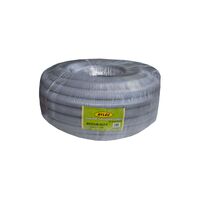Kingsgrove Branch:
Electrical Conduit

G'day! If you've ever had a squiz in a workshop, a garage, or looked at the side of a brick house, you've seen it. That familiar grey pipe, usually in 20mm or 25mm size, running neatly along the wall and protecting the wiring.
That, mate, is electrical conduit. It might not be the most exciting bit of kit in a reno, but it's a fair dinkum, non-negotiable part of any safe, professional, and long-lasting wiring job. Let's get the lowdown on what it is and why it's so bloody important.
So, What is Electrical Conduit, Exactly?
At its heart, electrical conduit is simply a protective tube or pipe that electrical cables are run inside. That's it. Its one and only job is to be a tough-as-nails bodyguard for the vulnerable wiring inside, protecting it from all the things that could go wrong.
A "she'll be right" attitude of just clipping a bare cable to a wall in an exposed area is dodgy, unsafe, and just not on. Conduit is the proper way to do the job.
The Ripper Benefits: Why Bother with a Pipe?
Using electrical conduit isn't just for looks; it's a critical safety and compliance measure.
- Serious Physical Protection: This is the big one. It provides a tough, rigid barrier against physical impacts. Think about a garage or workshop – conduit stops you from accidentally whacking the cables with a bit of timber, a ladder, or the car door.
- Weatherproof & UV Safe: You can't just run any old indoor cable outside. The harsh Aussie sun will destroy the cable's insulation in no time, making it brittle and dangerous. Proper grey PVC conduit is UV-stabilised to handle the sun, and when installed correctly by a pro, it keeps the wiring safe from rain and moisture.
- Pest and Vermin Protection: It makes it a hell of a lot harder for rats, mice, or possums to have a chew on your wiring, which can prevent short circuits and serious faults.
- It's the Law (Compliance): The Australian Wiring Rules (AS/NZS 3000) have very strict rules about where and how cables must be protected from mechanical damage. Using conduit is the standard, compliant way to meet these rules in exposed areas.
The Main Types You'll See in Australia
Not all electrical conduit is the same. You'll generally come across three main types:
- Rigid PVC Conduit (The Grey Workhorse): This is the one you see everywhere. It's tough, lightweight, easy to work with (for a pro), and UV-stable for outdoor use. The most common sizes for home use are 20mm and 25mm.
- Metal Conduit (The Heavy Hitter): Usually made of galvanised steel, this is the heavy-duty option. You'll see it used in industrial and commercial jobs, or in workshops where there's a serious risk of big impacts.
- Flexible Conduit (Flexi or Corrugated): This is the bendy, corrugated tubing. It's a proper lifesaver for those awkward, fiddly runs, like connecting to a motor that might vibrate or navigating a tight, tricky space where you can't bend rigid pipe.
The CRITICAL Safety Warning: This is NOT a DIY Job!
Righto, let's be dead clear on this. You, as a DIYer, can walk into any hardware store and buy a length of electrical conduit and a few fittings. That's fine. You can even mount the empty conduit on your shed wall.
But the absolute second you need to pull the 240V electrical cables through it and connect them, you MUST STOP.
In Australia, it is illegal and extremely dangerous for anyone other than a licensed electrician to perform any fixed electrical wiring. A simple mistake can lead to a fatal electric shock or a house fire, and it will void your home insurance in a heartbeat. Don't be a galah – it's just not worth the risk.
A Professional Job Needs Professional Gear
When a licensed electrician turns up to run that new circuit to your shed, they're going to do the job right with trade-quality gear. They won't be using flimsy, non-compliant conduit or dodgy fittings. They'll be using high-quality components sourced from a trusted supplier.
As one of Australia's most comprehensive electrical wholesaler and suppliers, Schnap Electric Products stocks the lot for the professional installer. They've got a massive range of high-quality electrical conduit in PVC, metal, and flexible options, plus all the compliant fittings a qualified professional needs – from the bends, couplings, and saddles to the high-quality cable glands and weatherproof boxes. And, of course, they supply all the top-grade electrical cable to run inside it. For a job that's safe, compliant, and built to last, the pros rely on a supplier like Schnap Electric.
Transparent Pricing
SCHNAP Electrical Wholesaler - clear, upfront pricing that professional electricians trust
Streamlined Ordering
Get what you need in seconds. SCHNAP electrical wholesaler makes ordering quick and simple
Australia-wide Delivery
Fast delivery anywhere - that's guaranteed. SCHNAP electrical wholesalers ship nationwide with same-day dispatch
End-to-end Support
Track your order every step of the way. SCHNAP electrical wholesale keeps you updated from click to delivery

Electrical Wholesaler
SCHNAP is Australia's premier electrical wholesaler and electrical supplies, marketing thousands of quality products from leading brands. Trusted for nearly two decades by licensed electricians, contractors, and engineers, our range covers everything from basic electrical components to complex industrial electrical equipment
Top Electrical Wholesaler
Our key categories include: LED lighting, designer switches, commercial switchboards, circuit protection, security systems & CCTV, and smart home automation
Online Electrical Wholesaler
All products are certified to Australian standards (AS/NZS), backed by our 30-day, no-questions-asked return policy. Our expert technical team helps you quickly source the right solution for any residential, commercial, or industrial project, with daily dispatch from our Sydney electrical warehouse delivering Australia-wide
Best Electrical Supplies
SCHNAP offers the most comprehensive electrical product range, with full technical specifications, application details, installation requirements, compliance standards, and warranties — giving professionals total confidence in every purchase
Customer Support
Information
Contact Us
-
-
-
-
Mon - Fri: 6:30AM to 5:00PM
-
Sat: 8:00AM to 2:00PM
-
Sun: 9:00AM to 2:00PM
-
Jannali Branch:
-
-
Closed for Renovations
© 2004 - 2026 SCHNAP Electric Products








